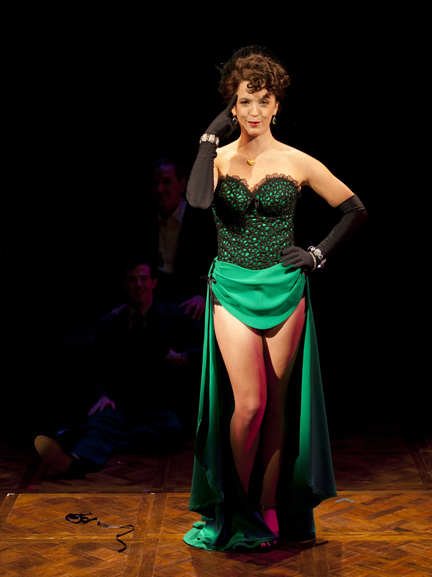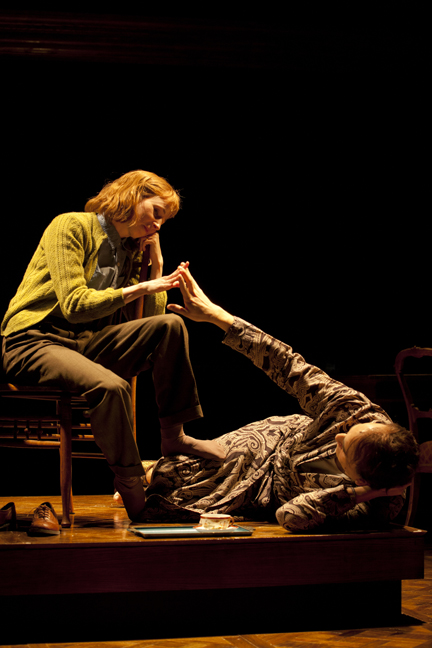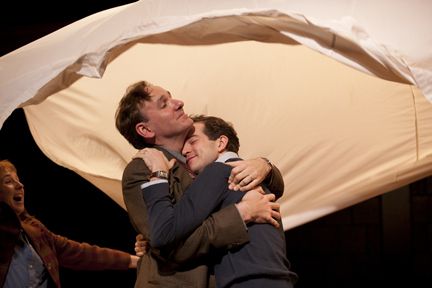An extended recreation of a grand folie à deux, The Twins Would Like to Say, by Seth Bockley and Devon de Mayo, at the Yale Cabaret, creates an oddly jangled take on “the silent twins,” June and Jennifer Gibbons, two children who were born in 1963 in Barbados, then, shortly after, moved to Wales with their family. To say the girls never managed to fit in is a gross understatement. Bullied and taunted, they withdrew into utter silence around anyone but each other, speaking, sister-to-sister, in a language that included mirror-movements and private words. A play about the girls’ ordeal—which eventually develops into an attempt to write and sell fiction, and then, frustrated, to acts of arson—might require a variety of tones, and that seems to be what Bockley and de Mayo’s text, directed by Whitney Dibo and Lauren Dubowski, aims for. Performed promenade style, the staging invites the audience to move around, choosing individual vantage points on the action. At some points, more than one scene is playing, but, fortunately, due to the intimate dimensions of the Cab, it’s fairly easy to keep an eye and ear on different things simultaneously. Except, that is, when a black curtain separates the playing space at the conclusion so that the ending you witness depends on which side you’re on (I ended up with June, the sister who is still alive; Jennifer died, mysteriously, in 1993, at age 30).
The staging keeps things more lively than they might otherwise be (I liked changing my perspective on the action and would like to have that option in more shows), but it also adds a kind of cut-up quality that may or may not be the intention. In any case, the shifts keep us from the usual comfortable immersion into a story unfolding at one time for us all. But I have to say I don’t see a great deal of point in the overlapping. It would make sense if the twins were ever apart, so that the audience would have to follow the experience of one or the other, but in every scene until the conclusion, the twins—played with intense concentration by Chasten Harmon (June) and Sarah Williams (Jennifer)—are inseparable.
The entertainment value of the show is largely a matter of the “shadow twins”—Maura Hooper (June) and Willa Fitzgerald (Jennifer)—who get to act out what the twins keep locked away. They also enact , as Chloe (Hooper) and Jenny (Fitzgerald), the mean girls of the neighborhood and, joined by Lance (Matt Raich), a local youth friendly to the twins, they also act out the stories the twins write. Lurid tales such as “Pepsi-Cola Addict” (a tale of teen dysfunction), “The Pugilist” (a sort of horror story told very engagingly with shadow puppets), and “Discomania” (you can imagine), which concludes with a conflagration at a disco—a fate that shortly engulfs the twins’ school.
You might well ask what’s it all leading to. If we’re meant to see the twins as misunderstood geniuses their fictions suggest otherwise. If as victims of social stratification, the play suggests that at least some of the Welsh locals try to accept them—Lance is sympathetic, though he has to break off due to unrealistic fantasies from June, and the psychiatrist (Emily Zemba), while offering only silly activities, seems well-meaning. The twins’ parents (Sheria Irving and Leonard Thomas) simply smile bravely (the mom) or scowl threateningly (the dad) and seem otherwise clueless. Mr. Nobody (Ilya Khodosh), our master of ceremonies, is great at set-ups, but not much at transitions.
What it leads to, not quite grippingly, is death as a final separation and the odd feeling of a play whose heroines are an oddly silent, unknowable center. Along the way there are laughs and spirited vignettes, and Brian Dudkiewicz’s set is a lot of fun to move around in, providing key spaces and also good flow, but the play only lets us hear the twins’ voices in a few passages from their journals where they sound like any other glibly self-centered and judgmental teens. In the end, there seems not much The Twins Would Like to Say has to say.
The Twins Would Like to Say By Seth Bockley and Devon de Mayo Directed by Whitney Dibo and Lauren Dubowski
Dramaturg: Kelly Kerwin; Set Designer: Brian Dudkiewicz; Assistant Set Designer: Samantha Lazar; Costume Designer: Steven M. Rotramel; Lighting Designer: Christopher Ash; Sound Designer: Sam Ferguson; Stage Manager: Molly Hennighausen; Producer: Katie Liberman
Yale Cabaret 217 Park Street April 4-6, 2013




